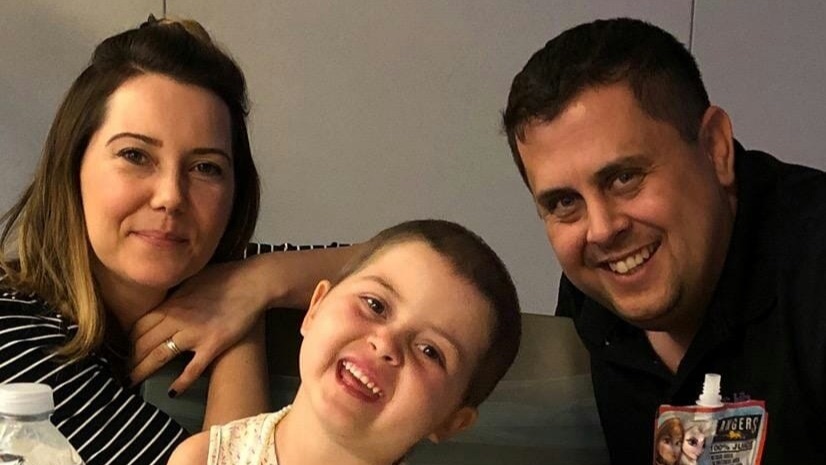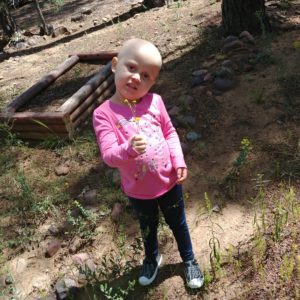
By Joyce Coronel
“Please can we go to the park, Daddy? Pleeeease?” Such is the plea parents in 2019 may long to hear. In a milieu in which video games and digital devices captivate, swinging across the monkey bars may not hold quite the appeal it once did for children.
That’s not the case for one little girl who misses the carefree pleasures to be had on area playgrounds. Lily Taylor has leukemia. She is 5 years old.
Her parents, Brad and Peggy Taylor, say the family’s cancer journey began with what seemed like an ordinary childhood illness—an ear infection.
“She did have an ear infection, but the reason she couldn’t get rid of it was because she did not have an immune system at the time. And that was due to leukemia,” Brad says.
Lily is the couple’s only child. That their daughter would be diagnosed with such a serious condition never crossed their minds.
“It was a tidal wave. That’s really the only way I can explain it,” Brad says. The diagnosis of Acute Lymphoblastic Leukemia came on December 19 and the family spent Christmas and New Year’s in the hospital alongside Lilly.
“She had over 200,000 cancer cells in her body at the time. They start nuking them with chemotherapy immediately,” Brad says. “Literally we found out at around two in the morning and by 8 a.m. I had signed enough documentation to buy a house.”
After spending a month in the hospital, Lily was discharged and went into outpatient treatment. It was supposed to be just a couple of times a week but complications nixed that plan.

“We went to and from the hospital every single day to receive a chemotherapy shot or an IV bag full of chemo or a blood transfusion,” Brad says.
As the treatments kill fast-growing cancer cells, they also kill fast-growing good cells—including the immune system. Patients go into something called neutropenia, an immune-compromised state. A healthy child might have between 1500-2,000 neutropenic or baby white blood cells to fight infection or kill bacteria.
“Our child would only have like two or five or 200,” Brad explained. “So in order to keep her healthy, we had to keep her at home.”
It wasn’t easy. “She’s a high-spirited child,” Peggy explains. “When she was neutropenic and too sick to go anywhere, it became difficult for all of us because she was pretty depressed.”
The couple had to take Lily out of daycare and preschool. No more trips to the library or church or the playground. “She could no longer go to any of the places she once enjoyed,” Brad says. “That happens for about eight months as they go through this process.”
The “process” is one that would make the most battle- hardened soldier shiver. After the medical team gets the child stabilized, treatments mellow out for a bit, but the phase known as delayed intensification comes next.
“That’s when her hair fell out, her skin was peeling off and she was throwing up,” Brad says. It was the middle of summer and Lilly had been fighting the cancer since December.
“After having her home for six months, we had nothing else to do.
“She was tired of the medicine and the side effects because the only thing we ever got to do was go to the hospital,” Brad says. He decided to take her for a drive to get her out of the house. As they made their way through the winding streets, Lily spotted a playground.
“She begged me to get out of the car and play. And I could not let her. I could not let her play,” Brad related, his voice thick with emotion. “She lost it. She was throwing shoes at me and screaming and crying. Eventually she ended up crying herself to sleep.”
Brad got her home, laid her down on the couch and went upstairs to take a shower.
“To be 100 percent honest about this, I started praying hard. What do I do in this situation? Why have you put this in my life? What’s my response to this?” The answer would be forthcoming.
The next morning when Brad woke up, he had an epiphany: He would build a special playground for kids like Lily. And that’s how the concept of Lily’s Pad was born.
When it’s completed, Lily’s Pad will be a 2,500-4,000 square-foot indoor playground with the same climate control and air purification system as a hospital. It will be hyper-cleaned like an operating room. The Taylors are looking for a North Tempe location for Lily’s Pad, somewhere that would be midway between Phoenix Children’s Hospital and Cardon Children’s Medical Center, the two facilities that provide pediatric cancer treatment. Lily’s Pad, the Taylors say, will help give kids back their childhood.
“Our goal was to be able to give parents and children a place to gather again, a
place to have a sense of community but also to be able to interact with physical touch where they weren’t going to be transmitting diseases,” Brad says.
To keep the playground safe for children fighting cancer and other diseases that weaken the immune system, the playground will be fogged twice daily with a military-grade cleaning agent called Decon7.
“We are working with Baylor University which is one of the leading infectious disease programs,” Brad says.
“We’re working with a scientist there to create the most hyper-clean space we can.”
The Taylors hope to open Lily’s Pad April 29, 2020. They’ve got a special reason for such a particular date.
“Lily’s last treatment is April 28 of 2020,” Brad says. “We want Lily to open the doors to the public cancer free. It’s our goal for her to cheer other children on and say, ‘I am Lily and you can beat this.’”
Lily’s Pad won’t happen without community support and the Taylors are still in need
of sponsors, donors and space.
Information: LilyspadAZ.org or email Brad@specialmomentsaz.com.

